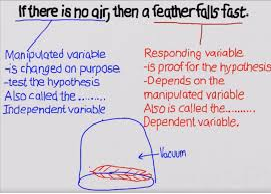Experiments on Dependent and Independent Variables Order Instructions:

Redo the experiments section (Section 8, Section 9, and Section 10). The following four points are guidelines/requirements.
1)The experiments must be critical experiments. (Refer to Lave and March section 3.2.2.)
2)You must have enough critical experiments to distinguish all of your models from each other. Remember, if an experiment predicts the same result for each model, then it is not a good experiment.
3)All of the experiments must be natural experiments (as defined by Lave and March – and in class).
4)Make sure that you specify which model is supported by a particular experimental outcome. And make sure that for each experiment you discuss more than one outcome.
3. You will have to operationalize all of the variables used in the experiments, and you will have to indicate which variables are dependent variables and which variables are independent variables. (This is the only completely new thing you have to be doing for this assignment.)
4. Realize that we are expecting more at this point. Just because you received nine or ten points on your previous assignment does not mean that you will earn as many points for the same work here.
The form of this exercise should look like this:
1)Everything from Exercise Two, not including the section on natural experiments. (This consists of the first seven parts of Assignment Two.)
2)Description of the first critical experiment
a)Describe the experiment.
b)State which is the independent and dependent variables.
c)State how you are going to operationalize the variables.
d)Describe the outcomes and state which model each outcome supports
3)Description of the second critical experiment.
a)Describe the experiment.
b)State which are the independent and dependent variables.
c)State how you are going to operationalize the variables.
d)Describe the outcomes and state which model each outcome supports
4)Continue until you have no more critical experiments.
Experiments on Dependent and Independent Variables Sample Answer
Critical experiments
Model one: Women are more eager for love. Generally speaking, women appear to be more eager for love in many films, novels and stories. They suddenly fall in love with someone after the first meet.
Model two: Men are the support of the families, so they spend more time on studying and working than searching for love. Men regard to career or job as the most crucial thing after graduation. They need to make money and support their family, so they have to work hard before getting married.
Model three: Women like children, so they want to have their children after marriage. (They want to become a mother.) Usually, women are playing the role of taking care of children in most families since they are merciful.
Experiment 1: After graduation, women prefer to get married to men who are older.
Dependent variable: Older men. For a marriage to take place, the man must be older than the woman.
Independent variable: Marriage. Marriage has to take place after graduation.
Outcome: 1. Women are sensitive to the age of since they are considered to age more than men. A woman wants to look younger than the man hence will look for a man that is older to get married to.
- Since women want to get married after graduation more than their male counterparts, they have to seek older men, or they will wait for long before getting married.
Implications: 3. Men have less to worry about in the sense of marriage like giving birth and taking care of children is mostly left to women. Men are just supposed to provide financially and are therefore not eager to get married before they get stable income.
- Men have more responsibility to take care for and mostly prefer younger women. Since they have to marry women that have already graduated, they have first to concentrate on their job as they wait for the younger women to graduate.
The experiment supports model two.
Experiment 2: Marriage does not require a person to be financially stable.
Dependent variable: Marriage
Independent variable: Financial stability
To make the variables work, men and women must be eager for marriage after graduation.
Implications: 1. Women will fall in love with a man even if he doesn’t have money since they just want to be loved hence they can get married without being financially stable.
- There are a lot of responsibilities that arise after marriage and men are the ones looked upon. Though there is love, a man has to consider having finances before marriage.
- Children are part of the family and to bring out children requires finances. It is, therefore, impeccable that financial stability is established before getting married.
The experiment supports model one.
Experiment 3: Men and Women get married to get children
Dependent variable: Children
Independent variable: Marriage
Outcomes: 1. Love and financial stability do not have to exist for children to be born. A man and a woman can just get married and have children.
- There are expenses that must be incurred for the pregnancy and the whole process of giving birth.
The experiment supports model three.
Experiments on Dependent and Independent Variables Work Cited
March and Lave, 1993. An introduction to models in the social sciences.




